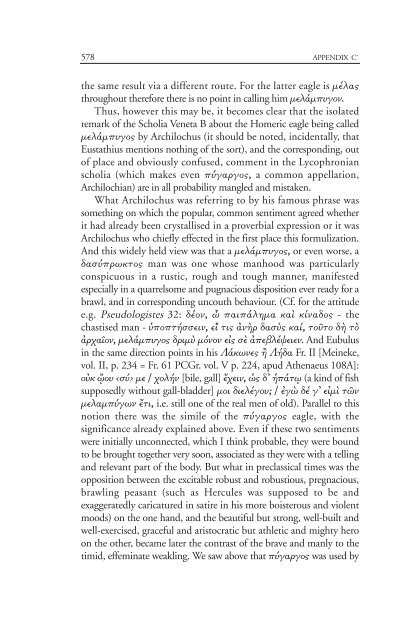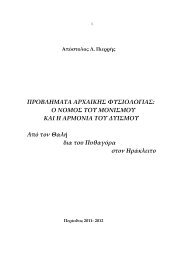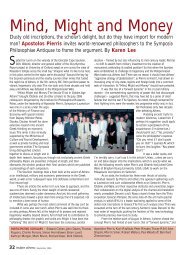APPENDIX C΄ ON DEPILATION: BODY COSMETICS IN CLASSICAL ...
APPENDIX C΄ ON DEPILATION: BODY COSMETICS IN CLASSICAL ...
APPENDIX C΄ ON DEPILATION: BODY COSMETICS IN CLASSICAL ...
You also want an ePaper? Increase the reach of your titles
YUMPU automatically turns print PDFs into web optimized ePapers that Google loves.
578 <strong>APPENDIX</strong> <strong>C΄</strong><br />
the same result via a different route. For the latter eagle is ̤Ϸ˜<br />
throughout therefore there is no point in calling him ÌÂÏ¿Ìapple˘ÁÔÓ.<br />
Thus, however this may be, it becomes clear that the isolated<br />
remark of the Scholia Veneta Β about the Homeric eagle being called<br />
ÌÂÏ¿Ìapple˘ÁÔ˜ by Archilοchus (it should be noted, incidentally, that<br />
Eustathius mentions nothing of the sort), and the corresponding, out<br />
of place and obviously confused, comment in the Lycophronian<br />
scholia (which makes even apple‡Á·ÚÁÔ˜, a common appellation,<br />
Archilochian) are in all probability mangled and mistaken.<br />
What Archilochus was referring to by his famous phrase was<br />
something on which the popular, common sentiment agreed whether<br />
it had already been crystallised in a proverbial expression or it was<br />
Archilochus who chiefly effected in the first place this formulization.<br />
And this widely held view was that a ÌÂÏ¿Ìapple˘ÁÔ˜, or even worse, a<br />
‰·Û‡appleÚˆÎÙÔ˜ man was one whose manhood was particularly<br />
conspicuous in a rustic, rough and tough manner, manifested<br />
especially in a quarrelsome and pugnacious disposition ever ready for a<br />
brawl, and in corresponding uncouth behaviour. (Cf. for the attitude<br />
e.g. Pseudologistes 32: ‰¤ÔÓ, t apple·Èapple¿ÏËÌ· ηd Λӷ‰Ô˜ - the<br />
chastised man - ñappleÔappleÙ‹ÛÛÂÈÓ, Âú ÙȘ àÓcÚ ‰·Ûf˜ η›, ÙÔÜÙÔ ‰c Ùe<br />
àÚ¯·ÖÔÓ, ÌÂÏ¿Ìapple˘ÁÔ˜ ‰ÚÈÌf ÌfiÓÔÓ Âå˜ Ûb àapple‚Ϥ„ÂÈÂÓ. And Eubulus<br />
in the same direction points in his §¿ÎˆÓ˜ j §‹‰· Fr. II [Meineke,<br />
vol. II, p. 234 = Fr. 61 PCGr. vol. V p. 224, apud Athenaeus 108A]:<br />
ÔéÎ ˇüÔ˘ Ì / ¯ÔÏ‹Ó [bile, gall] ö¯ÂÈÓ, ó˜ ‰’ ìapple¿Ùˇˆ (a kind of fish<br />
supposedly without gall-bladder] ÌÔÈ ‰ÈÂϤÁÔ˘; / âÁg ‰¤ Á’ ÂåÌd ÙáÓ<br />
ÌÂÏ·Ìapple‡ÁˆÓ öÙÈ, i.e. still one of the real men of old). Parallel to this<br />
notion there was the simile of the apple‡Á·ÚÁÔ˜ eagle, with the<br />
significance already explained above. Even if these two sentiments<br />
were initially unconnected, which I think probable, they were bound<br />
to be brought together very soon, associated as they were with a telling<br />
and relevant part of the body. But what in preclassical times was the<br />
opposition between the excitable robust and robustious, pregnacious,<br />
brawling peasant (such as Hercules was supposed to be and<br />
exaggeratedly caricatured in satire in his more boisterous and violent<br />
moods) on the one hand, and the beautiful but strong, well-built and<br />
well-exercised, graceful and aristocratic but athletic and mighty hero<br />
on the other, became later the contrast of the brave and manly to the<br />
timid, effeminate weakling. We saw above that apple‡Á·ÚÁÔ˜ was used by










